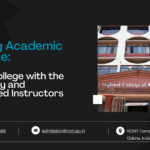On September 30, Jaipur National University, a self-financed university, filed a court challenge against the UGC’s NAAC-based eligibility standards for offering online education and ODL.
The Rajasthan High Court upheld the University Grant Commission’s (UGC) NAAC-based eligibility standards for offering Open and Distance Learning (ODL) or online education, the UGC said in a statement on Monday.
On September 30, Jaipur National University, a self-financed university, filed a court challenge against the UGC’s NAAC-based eligibility standards for offering online education and ODL. However, after considering the UGC’s viewpoint, the court upheld the UGC guidelines.
The National Assessment and Accreditation Council (NAAC) assesses and accredits higher educational institutions (HEI) such as colleges, universities, and other recognised institutions in order to determine the institution’s “Quality Status.’
In discussing the recommendations, UGC chairman professor M Jagdish Kumar stated that the Rajasthan High Court dismissed the writ case brought by Jaipur National University, ruling that the petitioner’s grievance has no credibility, let alone legal substance.
“Further, while dismissing the petition, the Hon’ble Court upheld the legal validity of the UGC Regulations and their provisions,” Kumar added.
The self-financed university challenged the legality and validity of the second proviso to Regulation 3(A) of the University Grants Commission (Open and Distance Learning Programmes and Online Programmes) Regulations, 2020, and sought a declaration that the impugned second proviso to Regulation 3(A) of the Regulations of 2020 was unconstitutional in law and could not be imposed.
The petitioner further requested a writ or directive in a Mandamus from the respondents allowing the petitioner to run and conduct open and distance learning (ODL) courses for the 2020–21 academic year.
On October 12, 2020, UGC issued a public notification extending recognition to certain higher educational institutions (HEIs) for the academic year 2020–21, beginning in July 2020, for offering just those programmes under ODL mode that were already recognised for the academic session 2019–20.
However, the name of the petitioner university was not included in the eligibility list of higher educational institutions (HEIs) for continuation of recognition for a period of one year. The petitioner-university was apparently not included in the list of eligible HEIs due to the second proviso to Regulation 3(A) of the Regulations of 2020, as the petitioner had not applied to the NAAC on or before February 29, 2020.”This gave rise to the university’s cause for filing the writ petition,” the UGC claimed.
“While opposing the petition’s relief, the UGC argued that the impugned second proviso to Regulation 3(A) of the Regulations of 2020 was introduced to deal with the cases of those HEIs that were compliant with various legal requirements and directions issued by the UGC from time to time and had submitted applications for accreditation on or before February 29, 2020 and that the benefit of said proviso could not be claimed by non-compliant institutions like the p
According to the UGC chairman, while many institutions applied, the petitioner, for reasons best known to it, did not apply to the NAAC for an upgradation of its grade to secure a minimum of 3.26 NAAC score on a 4-point scale, in order to be eligible to offer Distance and Learning (ODL) programmes in the next academic year 2020–21.
The obligation to get a NAAC score to be qualified to deliver Distance and Learning (ODL) teaching programmes for the academic year 2020–21 was statutorily mandated by the Regulations of 2017. (Occasionally modified)
“The UGC has fixed February 29, 2020, as the last date for submission of applications, keeping in view that unless applications are submitted well in advance, there is no possibility of institutions achieving higher grades through the NAAC accreditation process prior to the forthcoming academic session.
Therefore, the fixation of the cut-off date of February 29, 2020, which is four months before the end of the academic session, was not irrational, arbitrary or without any basis, “the UGC said.
The court also noted that even under the new 2020 Regulations, an NAAC accreditation of 3.01 on a 4-point scale is required, but the petitioner’s NAAC score is just 2.28. Thus, from whatever perspective, the petitioner’s complaint lacks validity, let alone legal grounding.
Source- Odisha TV




















